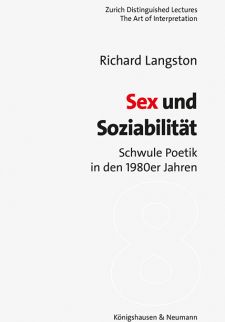Sex und Soziabilität
Richard Langston
2024
Königshausen and Neumann

In the 1980s, social history is described as a transitional phase to a so-called "neosexual revolution" characterized by commercialization and trivialization. In contrast, the book explores how and whether German-language fiction imagines risky sex in the context of HIV/AIDS as a poetic means of creating new forms of society. Representations of sexual acts in contemporary literature are nothing new to German studies. Sexual intercourse as a linguistic, poetic and philosophical problem has long been a recognized subject of research. What is still missing in the research literature, however, is a poetic answer to Bersani's challenge: what is needed is a literary reassessment of sociability through the poetic processing of the desire for equality and the devaluation of differences. This raises the important question of whether fiction in the 1980s even imagined such queer sociability, given the risks in the early years of the HIV/AIDS epidemic, and if so, how it manifested itself poetically. Using selected texts by both heterosexual and homosexual authors (e.g. Fichte, Jelinek, Morshäuser and Schernikau), the book examines the (anti-)social character of sexual intercourse and the poetic conditions under which experimental texts seek to bring sex into harmony with a recoded sociability.